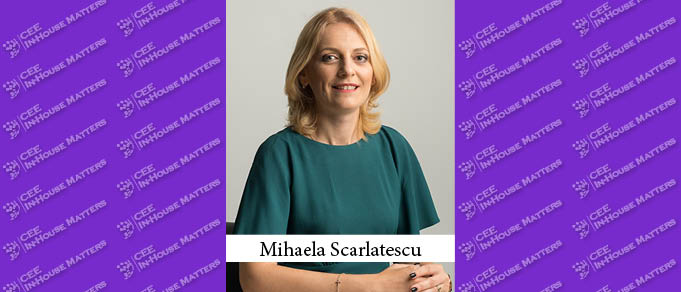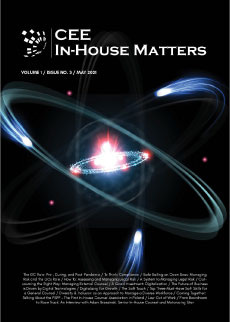Mihaela Scarlatescu, Head of Legal and Compliance Director at Farmexim & Help Net, explains how she and her team dealt with an expansion wave that saw her pharmacy chain add a hundred licenses in one year.
CEEIHM: Let’s start with an overview of your career.
Mihaela: I could say I’m part of the old guard by now, having practiced as a lawyer for over 20 years. I started my career as an independent solo practitioner as soon as I graduated from law school, and I worked in my own practice until 2007, when I joined my first pharmaceutical company, Actavis. I have to admit, it felt overwhelming at first, and I felt like I wanted to resign after my first day when I saw a manufacturing contract in front of me and told myself “I can’t do it.” I was lucky though. Laurentiu Scheausan, CEO at Actavis at the time, took care of me and encouraged me. He sat me down in our plant and showed me the manufacturing process from ground zero. That was a critical moment for me. It not only showed me how important it is to create associations with peers in the workplace, but the process also helped me see how it is all connected with the business, and how, at the end of the day, we help out real people get access to critical medicine.
After 2013, I joined the A&D Pharma Group – swapping a producer for a distributor. It was a fascinating role, as I was brought in to create rules and a compliance system to build the company’s infrastructure, with the end goal of selling the company. That role culminated in two huge M&A projects – first, the sale of A&D Pharma Group to Penta Investments, and second, a transaction that I was happy to see win the CEE Legal Matters Deal of the Year: the sale of one of A&D Pharma’s companies to Zentiva, in which I was directly involved.
After that point, I found myself at a crossroads. I was choosing between a European role with a big generic producer and an opportunity with Help Net (a Romanian nationwide pharmacy chain which, in 2018, was acquired by the Phoenix Group along with Romanian pharmaceutical wholesaler Farmexim). The latter ended up convincing me to join because of their planned expansion, which I found exciting.
CEEIHM: And how did that expansion that drew you in play out?
Mihaela: It was quite intense. I joined the company in February, and two days later I learned that we were in the last phase of closing a transaction involving 72 pharmacies. Instead of an induction, I found myself sitting down to run through the entire deal. I soon realized that the due diligence part of the deal was missing almost entirely – meaning I had to scramble to finalize that entire process within a ten-day window before the deal was due to be signed. We verified everything from the regulatory perspective and ended up rebuilding the contract from scratch. I remember we signed it in two weeks, and five months later, in July, competition clearance was obtained and the deal finalized. Since then we have bought another 45 licenses, on top of that initial burst of 55 licenses involved in the initial deal.
CEEIHM: What was the driving force behind this expansion?
Mihaela: It’s rather straight-forward. Help Net, as a network, aimed to expand as a result of the Phoenix Group’s competitive strategy at an EU level.
CEEIHM: What about the targets, where they all acquired from the same seller?
Mihaela: No, there was one big seller, but then we had a lot of negotiations independently with holders of one, or two, or three – maximum five licenses.
CEEIHM: Did you find that made the expansion easier or more difficult – and why?
Mihaela: It is a hundred times more difficult to negotiate with entrepreneurs and individual pharmacies, since we had to adapt to individual negotiations. Even if the due diligence side of things is easier, the negotiations phase is much more difficult.
CEEIHM: Was it simply a result of the volume of deals in parallel that made things difficult?
Mihaela: That didn’t help, but it was not the only element. We had to adapt not only to individual negotiations, but also take into account that not everyone worked with lawyers for these deals, and many of these entrepreneurs ran their business in the “Romanian style” of “we know it all.”
We had our template contract, of course, but that ended up being rebuilt from scratch many times with each seller ending up wanting something different. Without lawyers by their side many times it was difficult, both because we wanted to be ethical and not take advantage of them but also because it happened often that they wouldn’t understand elements coming from a legal perspective – that some things you simply can’t put into the wording of a contract.
And these individual negotiations also ended up feeling like herding cats at times, because it was difficult to explain in each individual talk why you needed to synchronize these deals to have synergy when it comes to the trade registry, for example – to announce all deals in one go.
CEEIHM: Did you rely on external counsel for all these deals?
Mihaela: When I first joined the company, it was working with Schoenherr. The firm supported us a lot on the concentration side and merger clearance with the competition council. Beyond that, on these transactions, we worked using purely our in-house team.
We have a young and enthusiastic team, including a former colleague that I worked with a lot on M&A at Sensi+. Even if it was an insane process, sometimes finalizing two or three transactions in a day, we manage to cope with it all between myself and the three people in the in-house legal team.
CEEIHM: Why did you opt to rely purely on in-house resources?
Mihaela: First, I am a control freak. Second, my role entails taking care of our budget and developing the team. Before joining, the company used to externalize every little matter and we were already over budget when I first joined the team. Slashing that excessive spending was a must and we didn’t find it too be too overwhelming. On the negotiation side of things, we have our own M&A manager negotiating the deals with us, and on the legal part, we felt the legal write-up was fairly straight-forward. And it was worth it, as, between all of these projects, the savings are in the realm of hundreds of thousands of euros. Of course, we are collaborating with external lawyers on sensitive tasks, and of course in situations when in-house lawyers feel too involved and biased and may have a conflict of interest.
CEEIHM: What was your most challenging acquisition?
Mihaela: The most difficult one for 2020 was not challenging from a legal perspective but from a negotiating one, with the seller changing their view every day. They didn’t show up at the official closing day, which was really stressful with no one knowing what happened. I ended up deciding to stop playing nice and checked that we were covered from a legal point of view when notifying the executor that we are ready to wire the down payment. The seller went to the notary soon after and we ended up closing the deal peacefully.
CEEIHM: What were your main lessons learned along the way? If you had to do it all over again, would you do anything differently?
Mihaela: First, I’d have the independent sellers have their own lawyers. I think that would spare everyone a lot of headaches. Second, I’d try not to get so personally involved – but I know myself and I know that’d be quite impossible.
This article was published in issue 1.2 of CEE In-House Matters. The full edition is available here in pdf format, here in e-reader format, and here in electronic format.


